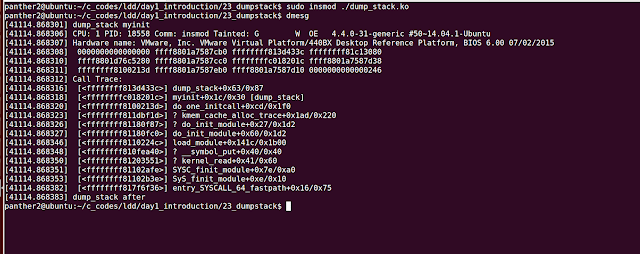One of the useful options in debugging is to print the call trace/stack trace. Linux kernel provides a function to print the stack trace: dump_stack(). The dump_stack function produces a stack trace much like panic and oops, but causes no problems and we return to the normal control flow.
Calling dump_stack() function will print the stack trace at that point.
Code:
#include <linux/module.h>
#include <linux/kernel.h>
static int myinit(void)
{
pr_info("dump_stack myinit\n");
dump_stack();
pr_info("dump_stack after\n");
return 0;
}
static void myexit(void)
{
pr_info("panic myexit\n");
}
module_init(myinit)
module_exit(myexit)
MODULE_LICENSE("GPL");
Output:
